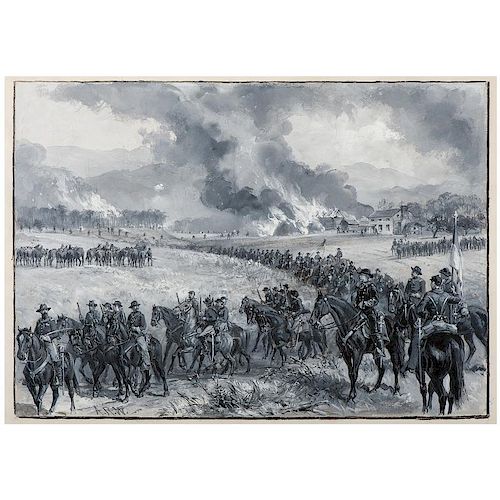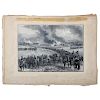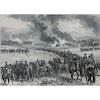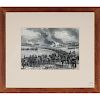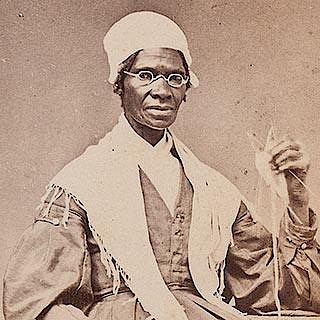General Custer's Division Retiring from Mt. Jackson, Virginia, and Burning the Forage, October 1864, Watercolor and Gouache b
About Seller
6270 Este Ave.
Cincinnati , OH 45232
United States
With offices in Cincinnati, Cleveland and Denver, Cowan’s holds over 40 auctions each year, with annual sales exceeding $16M. We reach buyers around the globe, and take pride in our reputation for integrity, customer service and great results. A full-service house, Cowan’s Auctions specializes in Am...Read more
Two ways to bid:
- Leave a max absentee bid and the platform will bid on your behalf up to your maximum bid during the live auction.
- Bid live during the auction and your bids will be submitted real-time to the auctioneer.
Bid Increments
| Price | Bid Increment |
|---|---|
| $0 | $25 |
| $500 | $50 |
| $1,000 | $100 |
| $2,000 | $250 |
| $5,000 | $500 |
| $10,000 | $1,000 |
| $20,000 | $2,500 |
| $50,000 | $5,000 |
| $100,000 | $10,000 |
About Auction
Jun 9, 2017 - Jun 10, 2017
Cowan's Auctions dawnie@cowans.com
- Lot Description
Watercolor and gouache on paper, 7.5 x 10.5 in., matted and framed, 15.5 x 18 in. General George Custer's Division (3rd) Retiring from Near Mt. Jackson, Virginia, and Burning the Forage. October 7, 1864. Initialed lower left, A.R.W. After a wartime sketch by Waud. Reproduced in Battles and Leaders of the Civil War, Vol. 4, p. 512; Alfred R. Waud, Civil War Artist, p. 169, plate 88, and wartime sketch p. 168, plate 87. General Custer on horseback stands out prominently in right foreground (as if depicted in 3-D), with his division in the background finishing its destructive campaign.
Beautifully finished artwork.
David L. Hack Civil War Art Collection
Lots 125-135
While the photographic process evolved rapidly from its inception in 1839 and the wet plate process of taking photographs was coming into widespread use by the start of the Civil War, it was a cumbersome process in the field as well as the studio. More significantly, at that time the photographs themselves could not be reproduced as illustrations accompanying written reports of the war.
As a result, publishers of newspapers and other periodicals in major cities, primarily in the North, employed a number of sketch artists who traveled with armies to draw the scenes that they witnessed. These sketches, most frequently pencil on paper with brief identifications of people and places, were then sent back by courier to the periodical publishers. The battlefield sketches received by the publishers were then copied by engraving artists onto wooden blocks, which were used in printing presses to illustrate printed articles covering the war.
Unlike the photographers of the day, who were limited to capturing the aftermath of battles, the sketch artists had the advantage of recording what they were witnessing as the events occurred before their eyes.
Lots 125-132 and 135 feature the original artwork of noted battlefield artist Alfred R. Waud (1828-1891). Born and raised in London, Waud studied at the Government School of Design at Somerset House before immigrating to the United States in 1850. Upon his arrival, Waud worked primarily as a freelance artist until May of 1861 when he was retained as a sketch artist and special correspondent by the New York Illustrated Newspaper to report on the war. At the close of 1861, Waud joined Harper's Weekly, where he was employed through the end of the war. He continued to work for Harper's Weekly in addition to a number of other publishers following the war and his career flourished. While touring battlefields in the South in 1891, Waud died in Marietta, GA. The Library of Congress houses most of his original wartime sketches, with some remaining in private hands.
In the 1880s, the popular Century Magazine started publishing the narratives of Civil War veterans and retained a large number of sketch artists including Waud to illustrate the articles. They used interviews, photographs, and prior war-date sketches to produce accurate pictorial representations of the war. These illustrated accounts were incorporated into a large four-volume work entitled Battles and Leaders of the Civil War in 1881. Almost a century later, in 1973, American Heritage Magazine acquired the collection of drawings that had been held by Century Magazine, which were subsequently reproduced in The American Heritage Century Collection of Civil War Art published in 1974. Christie's conducted two public auctions in 1988, which were comprised of the remaining original Century Magazine Collection of Civil War artwork that was dispersed by American Heritage Magazine, and a number of drawings by Waud were acquired by the consignor, with many being offered today.
Provenance: David L. Hack Civil War Art Collection - Shipping Info
-
SHIPPING. At the request of the buyer, Cowan's will authorize the shipment of purchased items. Shipments usually occur within two weeks after payment has been received. Shipment is generally made via UPS Ground service. Unless buyer gives special instructions, the shipping method shall be at the sole discretion of Cowan's Auctions, Inc.. Cowan's is in no way responsible for the acts or omissions of independent handlers, packers or shippers of purchased items or for any loss, damage or delay from the packing or shipping of any property.
-
- Buyer's Premium



 EUR
EUR CAD
CAD AUD
AUD GBP
GBP MXN
MXN HKD
HKD CNY
CNY MYR
MYR SEK
SEK SGD
SGD CHF
CHF THB
THB